2025 EMEA Investment Forum: From Innovate to Activate
The investment environment has been characterized by uncertainty in recent months. At our EMEA Investment Forum in London, investment leaders discussed tariffs and the evolving market backdrop, examined secular megatrends including artificial intelligence (AI) and sustainability, and considered the outlook for public and private markets. Our program was shaped around five themes—innovate, navigate, allocate, collaborate, and activate—to provide a framework for exploring potential opportunities.
Innovate
This year’s Forum opened at the Tate Modern with a focus on innovation. The integration of AI technology into enterprises is currently facing a slower adoption rate despite the emergence of numerous use cases. As AI rapidly advances, corporate leaders are deciding where and how to focus their resources. We believe that some of the most compelling opportunities to invest in AI may be emerging in companies operating in the data and security space.
AI has the potential to significantly enhance and elevate the process of ingesting, digesting, and applying judgment to vast amounts of information. For investors looking to invest with AI and capture uncorrelated returns, speakers agreed that access to alternative data, robust infrastructure, scale, and computing power will be key. Experience and human oversight also remain essential for balancing quantitative insights with qualitative judgment.
World-renowned, award-winning photographer and founder of The People’s Portfolio, Platon, known for his portraits of influential leaders, observed how some tech founders and CEOs believe AI requires a shift in mindset. Business leaders are often characterized by certainty and determination, but the effective implementation of AI demands curiosity, humility, and empathy to make human connections.
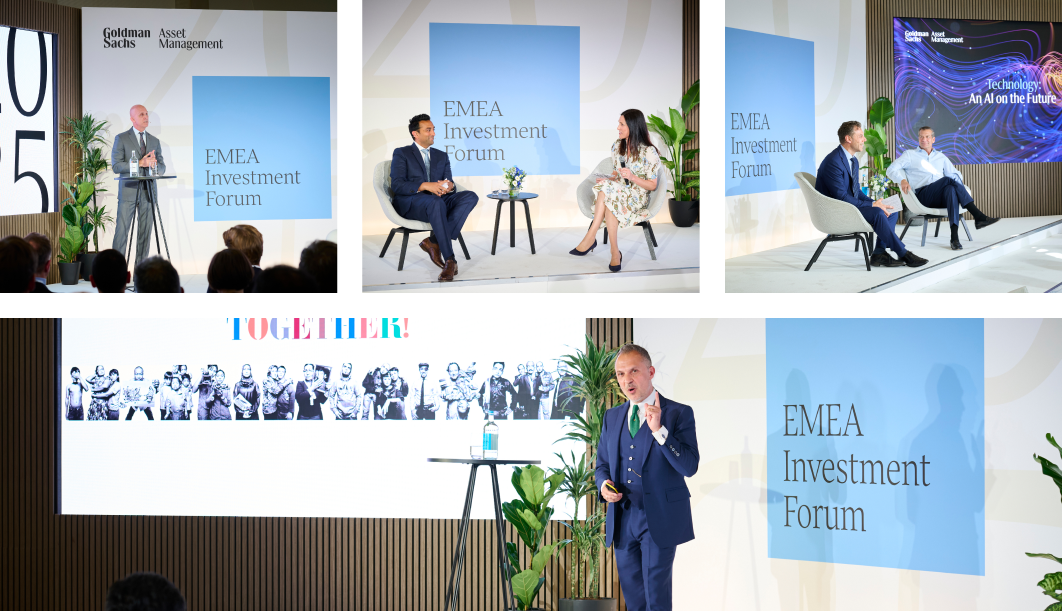
Navigate
On day two of the Forum, industry leaders gathered again at Goldman Sachs' London offices to navigate the economic landscape. In Europe, tariff negotiations and potential impacts on growth and inflation are top of mind. The speed and schedule of European spending plans around defense and infrastructure are also under scrutiny. More broadly, diverging soft and hard macro data, coupled with heightened US policy uncertainty, create a wide range of potential economic and market outcomes.
Speakers acknowledged that modernizing traditional 60/40 portfolios through diversification across assets has proven to be rewarding in a more volatile market backdrop. Private market exposure and both alternative risk premia strategies (both offense and defense) bring unique return profiles and genuine potential diversification benefits. We believe the potential advantages of increased international allocation in equities, bonds, and foreign exchange have come to the fore, while more balanced allocations across asset classes, sectors, factors, and regions promote resilience.
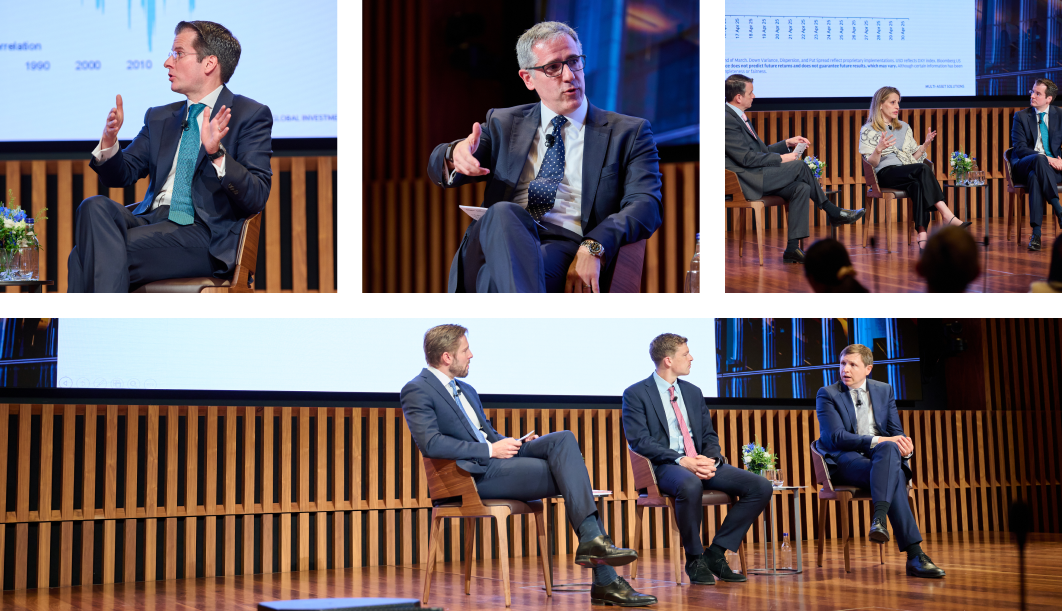
Allocate
We believe that the macro backdrop puts fixed income front and center, with markets acutely focused on the fiscal path forward and future debt dynamics. Investors acknowledged that today's environment requires a flexible approach to navigate the interplay of credit quality metrics, duration, and term premium, among other areas. A live poll revealed the following expectations for rates, growth and fixed income preferences1 in the second half of 2025.
- Interest Rate Cuts: A majority of respondents (53%) anticipate two interest rate cuts by the Federal Reserve (Fed). A significant minority (24%) expects one rate cut. Almost a quarter of the audience (23%) foresee no change in the Fed's policy.
- Economic Growth: The majority (68%) anticipates economic growth to align with historical averages. A smaller percentage (11%) expects growth to exceed historical averages. A notable portion (23%) expresses concern about a potential recession.
- Investment Preferences: Investors are evenly split on where the greatest value lies across investment grade credit, high yield credit, securitized credit, and emerging market (EM) debt.
We observe growing investor demand for private credit, driven by the defensive profile of the asset class, but also the potential attractive real yields available. Increased activity in secondaries is a notable trend as investors explore liquidity options. In private equity, speakers explored how value creation is paramount, and compelling investment opportunities are expected to emerge in the coming years, particularly in private infrastructure aligned with AI, demographics, and sustainability themes.
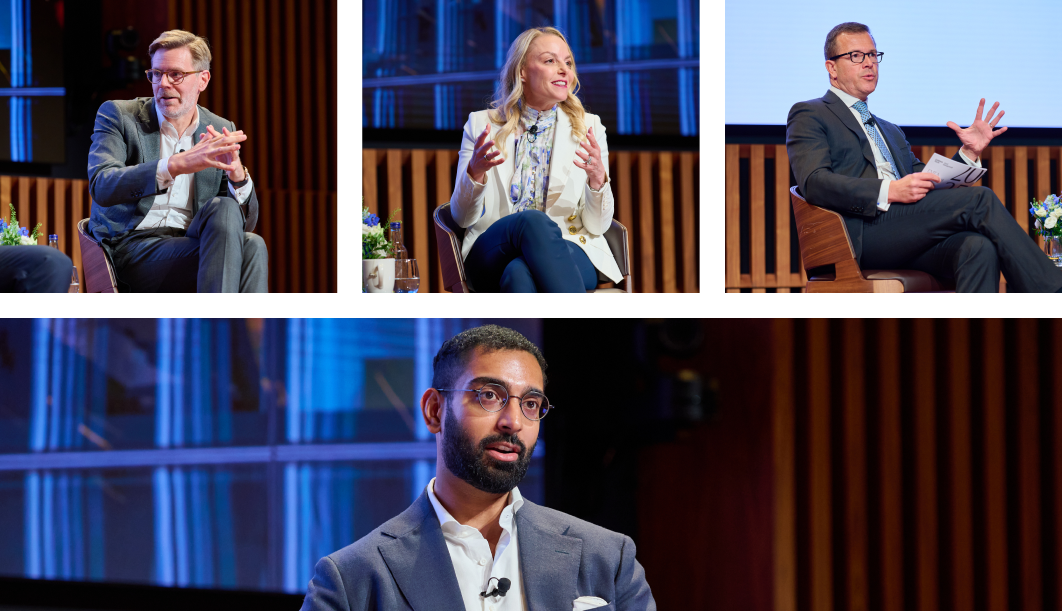
Source: Based on134 responses from investment professionals at the 2025 EMEA Investment Forum. As of May 21, 2025. Question 1. 95 respondents, 19% replied neutral, 9% replied decrease. Question 2. 95 respondents, 36% replied neutral, 4% replied decrease. Question 3. 110 respondents. Remaining 24% cited either inflation pressure or liquidity concerns.
Collaborate
Breakout sessions at this year’s Forum included a closer look at active ETFs, broadening equity market opportunities, hedge funds, and outsourced chief investment officer (OCIO) trends, among other topics.
In the equity market, there are many risks to manage going forward as a result of increased volatility due to geo-economic fragmentation and new waves of innovation. However, we believe this new environment is also unlocking exciting potential opportunities across sectors, geographies, and market-caps. Investors acknowledged that combination data-driven insights and underpinned by fundamental analysis will likely be needed to generate alpha. Higher equity-fixed income correlations are, in our view, also reinforcing the case for hedge fund inclusion in portfolios. Skillful manager selection is crucial, given the evolving hedge fund landscape and performance dispersion.
The active ETF market has experienced substantial growth, primarily driven by investor demand for lower-cost, transparent, and efficient investment options that complement existing allocations and provide diversification benefits.2 Meanwhile, an increasing number of pension schemes have turned to external specialists for investment management assistance. OCIO and fiduciary management services enable a greater number of pension schemes to delegate tasks such as asset allocation and investment strategy execution to specialized firms, often asset managers. This delegation allows schemes to leverage the external manager's investment expertise while freeing up trustees to focus on strategic planning.
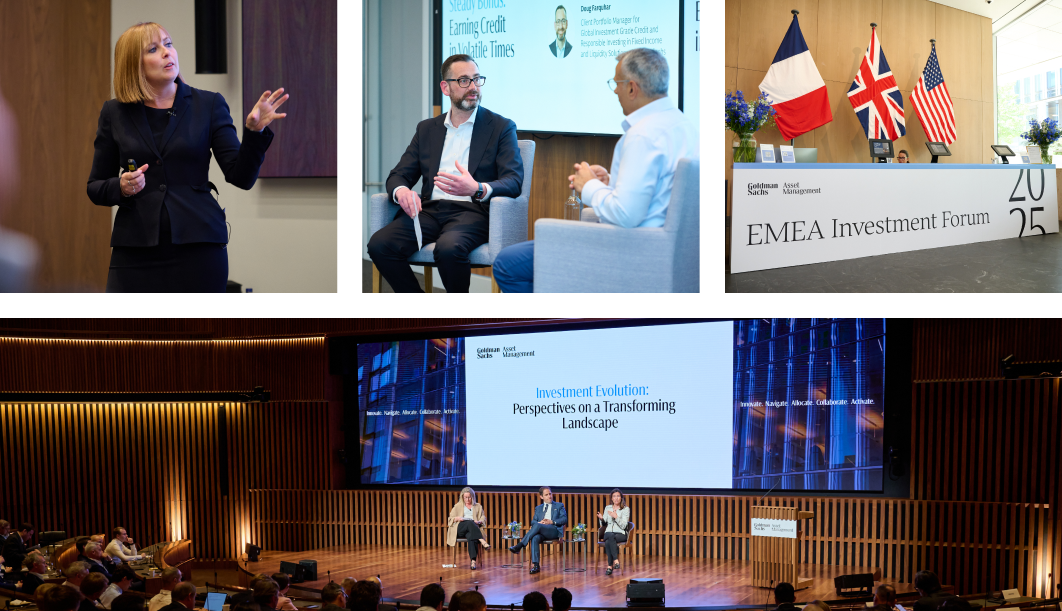
Activate
Investors discussed how the transition to a lower-carbon economy has gained momentum. Understanding the core drivers of this shift empowers investors to identify potential opportunities where rising power demand, resource efficiency, and reindustrialization converge. Actively pursuing climate goals is essential, but how we achieve them matters just as much. As temperatures rise and extreme weather events become commonplace, the focus is on activating adaptation and resilience strategies. This presents opportunities for investment in companies that are actively adapting their business models, becoming more resilient, and developing solutions that enable communities and companies to potentially thrive in a changing climate.
Resilience, Adaptation, and the Pursuit of Opportunity
In an increasingly unpredictable and volatile investment environment, resilience and adapting to changing conditions were overarching themes at this year’s event. Discussions on how to innovate, navigate, allocate, collaborate, and activate strategies highlighted that despite uncertainty, there is no shortage of opportunity. The 2025 EMEA Investment Forum concluded with a discussion with Sir Mo Farah, a decorated Olympic, World, and European champion athlete, who shared his remarkable journey both on and off the track, his winning mindset, and what it takes to adapt and overcome adversity.
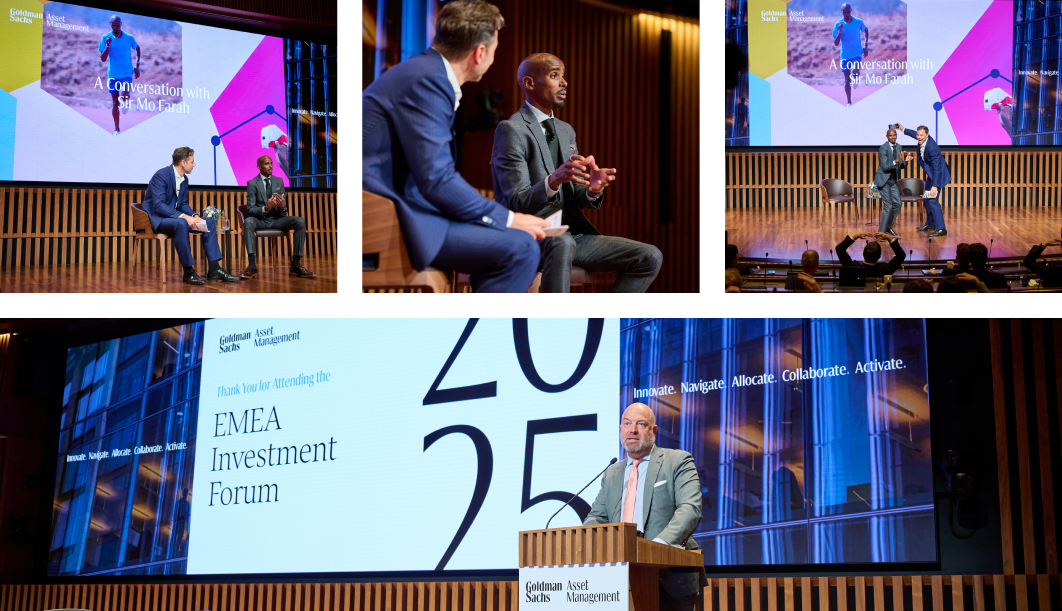
1 Based on 134 responses from investment professionals attending the 2025 EMEA Investment Forum. As of May 21, 2025.
2 Bloomberg, Morningstar. As of May 21, 2025.
